All screenings are held at the Auditorium at Northeastern Illinois University (Building E, 3701 W. Bryn Mawr Ave., Chicago, IL 60625), unless otherwise noted.
General Admission: $5 • NEIU Students: $2
Programmed and Projected by Julian Antos, Becca Hall, Rebecca Lyon, Kyle Westphal, and Cameron Worden.
Wednesday, January 13th @ 7:30 PM
PETER IBBETSON
Directed by Henry Hathaway • 1935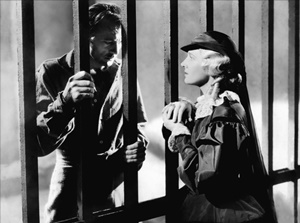
When soul-scarred architect Peter Ibbetson (Gary Cooper) accepts a commission from the Duke of Towers (John Halliday), he doesn’t anticipate a major complication: the Duchess (Ann Harding) is Peter’s childhood sweetheart. A flesh-and-blood reminder of Gallic idylls gone by, the Duchess stirs memories and fantasies to last a lifetime. After Ibbetson finds himself imprisoned for accidentally killing the husband, their forbidden love crackles on in dreams—and along the astral plane. The story was already an established phantasmal classic by 1935: George du Maurier’s 1891 novel had served as the basis for an unsinkable stage melodrama, instantly familiar to small town audiences everywhere. Its cause was also taken up by André Breton, who exalted Hathaway’s film version as an (unconscious?) “triumph of Surrealist thought.” Above all, it’s a supernatural vision realized with a disarming sobriety; largely bereft of special effects and fantastic sets, Peter Ibbetson achieves the transcendent through the disciplined force of studio craft, with Charles Lang’s cinematography and Hans Dreier’s art direction contributing mightily to the atmosphere of l’amour fou. (KW)
88 min • Paramount Pictures • 35mm from UCLA Film & Television Archive, Permission Universal
Short: “High Steel” (Don Owen, 1966) – 35mm – 14 min
Wednesday, January 20th @ 7:30 PM
THE SACRIFICE
Directed by Andrei Tarkovsky • 1986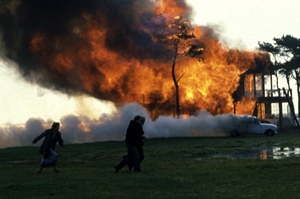
As bomber jets overhead signal the start of World War III, a man makes a deal with God for his own life in exchange for an end to the war. The final film by Andrei Tarkovsky (Solaris, Mirror) is without compromise. Punishingly long, devastatingly beautiful, and ultimately humbling, The Sacrifice was completed as the director was dying of cancer and struggling through years of crippling bureaucracy as an expatriate of the Soviet Union. Shot by frequent Ingmar Bergman collaborator Sven Nykvist, The Sacrifice winds through long, complex tracking shots and uses analog optical printing to find eerie spaces in between color and black and white. Unapologetically spiritual before Terrence Malick made it hip (for a moment), The Sacrifice earned unusual praise from Dave Kehr in the Chicago Tribune: “Nothing could be less fashionable than The Sacrifice… To conceive a movie as a prayer — this is a tremendous gesture at a time when movies are becoming smaller and smaller, more and more trivial. It’s hardly a gesture designed to attract a large public, but it remains a gesture of incredible courage.” (JA)
In Swedish with English subtitles
142 min • Svenska Filminstitutet • New 35mm from Kino Lorber
Short: “Doom Town” (Gerald Schnitzer, 1953) – 35mm – 15 min
Wednesday, January 27th @ 7:30 PM
MOONTIDE
Directed by Archie Mayo • 1942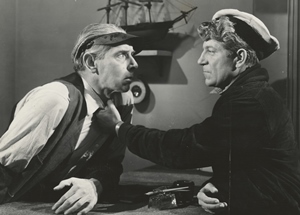
Long admired for setting art house hearts aflutter with his sweaty magnetism in French imports like Grand Illusion and Pépé le moko, Jean Gabin abruptly found himself in Hollywood in the wake of the Nazi occupation. His American debut, Moontide, was a cockeyed passion project adapted by novelist John O’Hara from a lascivious book that Gabin selected himself. Gabin stars as Bobo, the San Pablo dock worker with a funny name and a decidedly unfunny demeanor. After saving prostitute Anna (Ida Lupino) from suicide, the big lug tries his damnedest to turn his rented bait barge into a rickety paragon of domestic bliss—but how long can he sustain the charade when his jilted buddy Tiny (Thomas Mitchell) holds a deadly secret? After Gabin clashed with the project’s original director, Fritz Lang, Moontide was handed over to underrated journeyman Mayo, who managed to sustain the movie’s delicately ethereal tone. The resulting movie plays like an improbably romantic, proudly homegrown answer to the landmarks of French poetic realism (Le jour se lève, Le quai des brumes). (KW)
94 min • 20th Century-Fox • 35mm from Fox Library Services
Cartoon: Tom & Jerry in “Cruise Cat” (Joseph Barbera & William Hanna, 1952) – 35mm – 7 min
Wednesday, February 3rd @ 7:30 PM
OLD IRONSIDES
Directed by James Cruze • 1926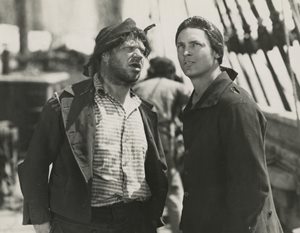
A premiere example of early epic action cinema, Old Ironsides plops Charles Farrell, Esther Ralston, and the crew of the merchant vessel Esther into the Battle of Tripoli Harbor alongside the titular ship, the USS Constitution. When Ralston is kidnapped by pirates in the Mediterranean, Farrell, with the assistance of legendary bruisers Wallace Beery and George Bancroft, takes it as his patriotic duty to rescue her and aid the US Navy’s efforts in stamping out piracy. The 1926 premiere of Old Ironsides was also the debut of the newly developed Magnascope widescreen process which involved opening the screen’s masking and switching lenses to magnify the film’s image during key scenes. While the popular narrative of film history positions widescreen projection as an enticement to viewers who had ditched the movies for television, Magnascope was one of many widescreen processes developed in the silent era and remained in common use through the 1940s. Used exclusively, in this instance, during the film’s battle sequences, the shift to a larger image gives Old Ironsides’s already remarkable action set-pieces an extra jolt, providing an experience that is the essence of cinematic spectacle. (CW)
Presented in Magnascope, with live organ accompaniment from Jay Warren.
111 min. • Paramount Pictures • 35mm from the Library of Congress
Short: “The Pillar of Fire” (George Méliès, 1899) – 35mm – 1 min
Wednesday, February 10th @ 7:30 PM
SUNNYSIDE UP
Directed by David Butler • 1929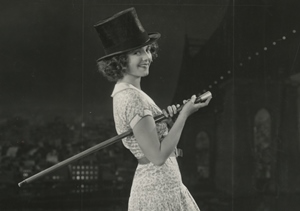
After their triumphant turns in 7th Heaven and Street Angel, Janet Gaynor and Charles Farrell stood as America’s most beloved silent screen couple. They could have made any film they wanted in 1929, and they embarked on a big, brash musical, undaunted by new Movietone recording technology or their own lack of vocal training. The result, Sunnyside Up, boasted a score by Tin Pan Alley veterans DeSylva, Brown, and Henderson (Just Imagine) and proved one of the major films of its era, outgrossing even The Broadway Melody. The story can be solved from a mile away—will Farrell’s stuffy Southampton playboy fall for Gaynor’s Yorkville tenement princess?—but the songs are memorable and the camerawork is exceptionally fluid. Then there’s the singular, Eskimo-themed show-stopper “Turn On the Heat,” a literal barn-burner whose appeal has been aptly described by musical historian Richard Barrios: “There was no restraint, not from sound men telling [director David] Butler and [choreographer Seymour] Felix what wouldn’t work, nor from censors, innate finer feelings, or the studio fire marshal.” (KW)
121 min • Fox Film Corp. • 35mm from the Museum of Modern Art, Permission Criterion
Short: TBD
Wednesday, February 17th @ 7:30 PM
MY OWN PRIVATE IDAHO
Directed by Gus Van Sant • 1991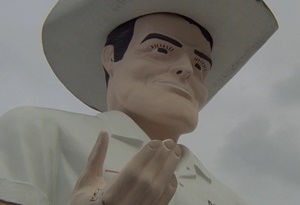
A sleepy, slow-burning adaptation of Shakespeare’s Henry IV, Gus Van Sant’s My Own Private Idaho is one of the finest American independent films of a brief and now-gone era when major studios still saw value in funding the weird, the sublime, and the small budget (or was it just a dream?). Centered around the experiences of a narcoleptic hustler in Portland (River Phoenix), the film borrows its checkerboard structure from William S. Burroughs, tossing and turning through the Pacific Northwest. Keanu Reeves is River’s love interest, another streetwalker who left his family (his father, the Mayor of Portland) but has an inheritance to collect when he turns twenty-one and will “leave this life behind.” Van Sant has developed a reputation for having one foot inside Hollywood (Milk, Good Will Hunting) and one firmly outside of it (Last Days, Elephant), but Idaho—a road movie, an urban western, and a coming-of-age film tied together with the soft and reassuring voice of Eddy Arnold—makes such distinctions irrelevant, bound only by a sense of place and time. (JA)
104 min • Fine Line Features • 35mm from Warner Brothers/Swank
Short: “Junior” (Gus Van Sant, 1992) – 16-to-35mm blowup – 4 min
Print courtesy of the Gus Van Sant Collection at the Academy Film Archive.
Saturday, March 5 @ Noon
Music Box Theatre – 3733 N. Southport Ave. – Special Admission Rate: $13
70mm SHORTS PROGRAM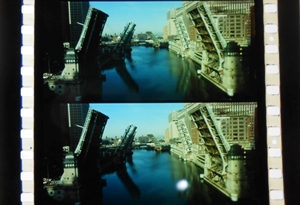
70mm isn’t just for epics. Since the format’s inception, 70mm has been used in theme parks, museums, and other non-theatrical spaces, making use of the wide, clear frame to simulate reality, tell the stories of our forefathers, and sell stuff. While films like Cleopatra and Lawrence of Arabia have seen loving, multi-million dollar restorations, few of these 70mm short subjects have been seen since their original runs, much less been preserved or restored, and most will screen in original prints from collections all over the country (the exception is the painstakingly restored Story of a Patriot). Program includes: Here’s Chicago: City of Dreams (1983), exhibited as part of the “Here’s Chicago” exhibit at the Water Tower Pumping Station; A Year Along the Abandoned Road (1991) Morten Skallerud’s beautiful time-lapse film shot over the course of a year in Hasvik, Norway; Winners (1968), a promotional film produced by Lincoln Mercury; Story of a Patriot (George Seaton, 1957), the longest running film in motion picture history, which has been shown nearly every day at Colonial Williamsburg since 1957; trailer reels, simulator ride films, and more!
Co-presented with the Music Box Theatre. Special thanks to Dave Kenig and Sharon Walker of Panavision, Morten Skallerud, and Mike Durling of Colonial Williamsburg
Wednesday, April 20th @ 7:30 PM
CISCO PIKE
Directed by Bill L. Norton • 1972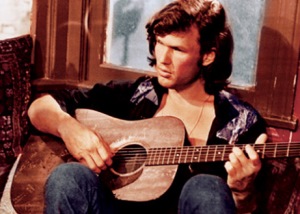
Described by director Bill L. Norton as “La Dolce Vita set in L.A.,” Cisco Pike co-opts the episodic structure of Fellini’s ubiquitous classic as an excuse to burrow into the post-’60s West Coast freak scene. Kris Kristofferson, in his first leading role, plays the title character, a washed-out rock star-turned-pot dealer blackmailed into unloading 100 kilos of marijuana in 48 hours by a crooked cop (a hyperventilating Gene Hackman). More concerned with texture than plot, the film takes its time unfolding, all the better to take in its myriad counterculture psychologies. Today, Cisco Pike appears primarily to be a repository of charming, distinctly early ’70s Americana, including, but not limited to: chunky sideburns, casually deployed western wear, and shambling hippie country rock. National treasures Karen Black and Harry Dean Stanton turn in winning supporting performances as, respectively, Kristofferson’s put-upon girlfriend and his burnout sideman. The soundtrack features tunes by Kristofferson and Doug Sahm (who also appears in the film) further capturing the spirit of the times. (CW)
95 min. • Columbia Pictures • 35mm from Sony Pictures Repertory
Short: “Marijuana, Driving, and You” (1980) – 16mm – 12 min
Tuesday, April 26th @ 7:30 PM
STATE FAIR
Directed by Henry King • 1933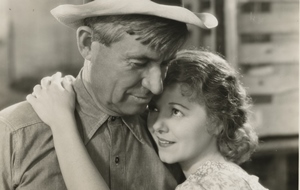
Before State Fair was a melody in Rodgers & Hammerstein’s ears, it was a popular novel by Phil Stone and a lovely film adaptation that became a heartland hit and earned an Academy Award nomination for Best Picture. Long overshadowed by its musical remakes, the original State Fair is a winning collaboration between two titans of homespun patois, comedian Will Rogers and director Henry King. Dropping his trademark topical humor, Rogers delivers a stirringly sincere portrayal of a farmer simultaneously devoted to his wife, Louise Dresser, and his prize pig, Blue Boy. (Old-fashioned or not, Rogers isn’t above spiking Dresser’s mincemeat with apple brandy.) Post-pubescent ragamuffins Janet Gaynor and Norman Foster accompany their parents to the Iowa State Fair and find love on roller coasters and inside trapeze tents. The whole thing is tied together by King’s preternatural talent for mining nostalgia from the everyday. Once asked whether he considered himself a creator of Americana, King replied, “Can only say that I love Americana and do not feel we have to create it. It is already here—but I do like to interpret it for the screen.” (KW)
99 min • Fox Film Corp • 35mm from Fox Library Services
Short: “The Immigrant” (Charles Chaplin, 1917) – 35mm – 21 min
Wednesday, May 4th @ 7:30 PM
GET CRAZY
Directed by Allan Arkush • 1983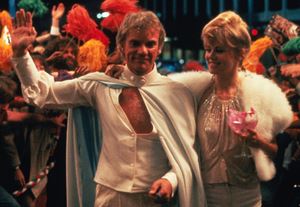
When veteran concert promoter and Saturn Theater leaseholder Max Wolfe (Allen Garfield) suffers a heart attack, it falls to his staff to organize the Saturn’s most ambitious New Year’s Eve party ever in hopes of saving Max and staving off his parasitic rival (Ed Begley Jr.), who plans on demolishing the venue. Financed primarily as a tax shelter and dumped into release with the understanding that it wouldn’t make any money (this turned out to be true), Get Crazy evinces the same go for broke attitude as its characters, cramming in more jokes, songs, drugs, cult screen and music personalities (Mary Woronov! Lee Ving! Paul Bartel! Lou Reed!!) and miscellaneous craziness than any American film of its day. Compulsively, incessantly hilarious, the lineage of Get Crazy can be traced to the Marx Brothers and Jerry Lewis, and in a just world, it would be regarded as a crass masterpiece on the order of The Ladies Man. Few films are as joyful in the face of embattlement and changing currents—no surprise it’s a personal favorite with the NWCFS staff. (CW)
92 min • Embassy Pictures • 35mm from Park Circus
Short: Excerpts from Alice Cooper’s “Billion Dollar Baby” (Alive Productions, 1973) – 16mm – 16 min
Wednesday, May 11th @ 7:30 PM
THE NAKED DAWN
Directed by Edgar G. Ulmer • 1955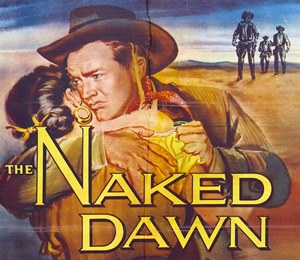
A rare chance to see B-movie master Edgar G. Ulmer work in fantastically garish Technicolor, The Naked Dawn is a tense and whimsical south-of-the-border Western brimming with lust, greed, and hate, just as nasty and intense as Detour. Shot on location in Mexico, The Naked Dawn stars Arthur Kennedy as Santiago the Bandit, who convinces a poor farmer (Eugene Iglesias) to join him on a train robbery. Lured by a life of crime, Iglesias plans to murder Kennedy, while his wife plots to kill him and run away with the Bandit. A favorite of François Truffaut, The Naked Dawn was one of the primary inspirations for Jules et Jim and a flurry of adjectives; the young director called it “poetic and violent, tender and droll, moving and subtle, joyously energetic and wholesome.” Screening in an original IB Technicolor Print from NWCFS Collections. (JA)
82 min • Universal International Pictures • 35mm, permission Universal
Short: “Around the World Revue” (George Robinson, 1956) – 35mm – 16 min
